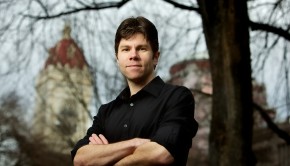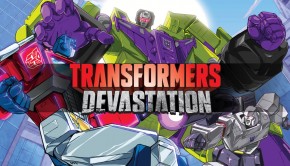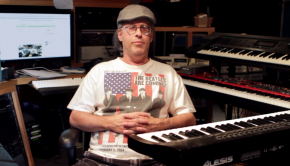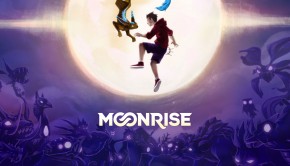Jeff Broadbent Interview: Quickly Emerging Game Composer
Jeff Broadbent is one of the emerging composers in the Western games industry. The classically-trained composer has worked on numerous film, television, and game projects over the years. However, it’s with the game adaptation of Transformers: Dark of the Moon and the brand new downloadable title I Am Alive that he has received widespread recognition.
In this interview, Broadbent discusses his musical influences and philosophies. He notes the importance of having original music in Transformers: Dark of the Moon, before emphasising the subtle themes and sonic colours he incorporated into I Am Alive. Overall, an interesting introduction to a composer we can expect to hear much more from.
Interview Credits
Interview Subject: Jeff Broadbent
Interviewer: Chris Greening
Editor: Chris Greening
Coordination: Greg O’Connor-Read
Interview Content
Chris: Jeff Broadbent, we appreciate your time today. Before we discuss your works in detail, could you tell us more about your background, education, and influences?
Jeff Broadbent: I had a love for music at an early age, beginning with playing the piano and saxophone from age 8 and age 10, and later I went on to be a state-solo finalist for classical saxophone. I began an in-depth study of music theory and also began composing at age 16. I studied formal composition at Brigham Young University, earning Bachelor’s and Master’s degrees there, and then studied film scoring at UCLA.
During my time as a student, I gained a great appreciatation not only for the classical and romantic composers such as Mozart, Brahms, and Beethoven, yet also a love for the avant-garde music of modern composers such as Schoenberg, Morton Feldman, Toru Takemitsu, and others.

Chris: Your works span television, commercials, trailer libraries, and iPhone projects. As a composer, how have you developed the skills and versatility required to work on such diverse content?
Jeff Broadbent: I think the key lies in a solid understanding of music fundamentals, and also a strong awareness of the musical techniques used to evoke different emotions. Though there are technical differences between film/television/games, at the core it’s all about composing music that engages the audience and supports the production. If one has a good understanding of melody, harmony, arrangement, etc, then those fundamentals will apply to many different projects.
Chris: Newcomers in the industry often find it hard to score major gigs. What is the story behind your own success? In particular, how did you become involved with Transformers: Dark of the Moon and I Am Alive?
Jeff Broadbent: Starting out can be quite daunting, especially because you are a freelancer and are essentially running your own business. I’ve found that having both musical and business skills are necessary. You need a solid understanding of game music, and the ability to create great demos for projects.
For Transformers, I had contacted the audio director, Rick Jackson, around the time when they were looking for composers, and it was a great fit because I had been composing a lot of action music for different productions prior to that. For I Am Alive, I got in touch with the audio director, Zhang Lei, and a couple of months later he mentioned they were looking for composers for the title. I then demoed for the project and was selected.
Chris: Focusing in, the game Transformers: Dark of the Moon featured plenty of original music, while the previous games in the series largely adapted the film scores. What inspired this shift? What do you think original music brought to the in-game experience?
Jeff Broadbent: The publisher specifically requested that all-new music themes be created, yet to also remain true to the musical vision set forth by the previous films and games. I think that original music adds a freshness to the game, and that it went well with the fact that the game was a pre-story for the film. This allowed the developers to create their own backstory for the pre-film events, and the original music was able to mesh well with that.

Chris: Inevitably, comparisons will be drawn between your score for the game and Steve Jablonsky’s score for the film. How do you feel about this? Were you inspired by Jablonsky’s music when writing for the game or did you take a novel direction?
Jeff Broadbent: I’m certainly flattered to be compared with a great composer like Steve. =) I did spend some time listening to Steve’s music for the previous film scores, in order to have a good understanding of the music of the franchise. I took the time to create my own themes and sonic approaches, while at the same time remaining true to what had been established as the tone for the Transformers universe.
Chris: The game Transformers: Dark of the Moon was scored with a smaller budget than the film. Was this ever limiting for you? How did you customise equipment to maintain a high quality sound?
Jeff Broadbent: If the budget allows, a live orchestra will always yield the best sound, because there’s nothing like 70+ highly-talented musicians working together to perform the score. That being said, the technology has become quite advanced, so the quality of virtual scores has become much higher than in years past. I always stay up-to-date with the latest software and samples, and take great effort to get a solid mix as well. I’m a skilled pianist, and perform all of the synth parts by hand. When composing with virtual instruments, the composing as well as the technical/mixing aspects are critical.
Chris: You described I Am Alive as a project that allowed creative freedom and exploration. Could you elaborate on this? Did the unique scenario of the game inspire your scoring approach?
Jeff Broadbent: When I first learnt about the game, I could tell that the developers were building a game from a very creative initial concept, an original idea. I think that the starting “seed” of the game, its conceptual design, lays the groundwork for the level of creativity that will follow. I was certainly inspired by this while composing. In many ways it reminded me of my time composing in university, where as students we were nurtured to break boundaries and think very creatively. I approached this project with the desire to represent the story and world of I Am Alive through sound.
Chris: Nevertheless, the title experienced quite a turbulent development, with shifts in developers, formats, and release dates. Did this affect your creative process at all, or did you compose the music relatively late in the title’s development?
Jeff Broadbent: I composed the music later in the game’s development, after it was taken over by Ubisoft Shanghai. As such, the longer development process did not affect the composing process.

Chris: You’re also an experienced sound designer. How did this background help you when creating an ambient score on I Am Alive? Did it help you carefully consider how music fits in to the big picture?
Jeff Broadbent: Having a background in sound design was very helpful in creating the sonically-driven score for I Am Alive. As a sound designer, one must pay very careful attention to timbre, frequencies, materials, etc.
As a student in university, I spent time studying avant-garde electronic music as well, which was very informative in helping me understand the importance of sonic color and how it relates to music. If you think of visual art, and how modern art moves away from representation of real-life objects, and instead uses color and texture as the basis of creation, ambient music is much the same. As a composer you are painting an aural picture with sound — not using the traditional approach of melodies and western harmonies, yet using the much more fundamental approach of sound itself.
Chris: The desperate struggle of the protagonist to survive and protect a young girl nevertheless provoked more emotional and thematic approaches from you. Could you tell us about the central themes for the game?
Jeff Broadbent: The main theme for I Am Alive involves a haunting solo piano melody, that represents the lone quest of the man in a vast world of devestation and abandonment. For the young girl Mei the protagonist protects, I used gentle oboe, string, and piano melodies that are simple yet poignant. These themes are not overly dramatic; rather, they are hopeful, yet somewhat sorrowful statements that convey the love and emotional connection that allow the man to carry on in a ravaged world.
Chris: Given such themes, many will want to hear the music outside the game. Are you considering a stand-alone soundtrack for this title? Do you think it will still stand up well out of context?
Jeff Broadbent: I certainly would like a stand-alone soundtrack for the game to be released. =) Selections from the soundtrack are also available with the I Am Alive Companion app. I think that if the listener enjoys ambient music, as well as poignant themes, they will enjoy the music out of context. Personally I love ambient music — when I think of composers such as Cliff Martinez, John Luther Adams, and others, there is certainly an audience for this music.

Chris: Many thanks for your time today, Jeff Broadbent. Is there anything else you’d like to say about I Am Alive or your work in general? Do you have any messages to readers from around the world?
Jeff Broadbent: Thanks very much for taking the time to speak with me! I would like say that I’m glad to have worked on I Am Alive, and have a lot of respect for the developers in creating such a unique game. I believe that such creativity is the foundation of great work, and it’s wonderful to see it nurtured.
Posted on March 1, 2012 by Chris Greening. Last modified on February 27, 2014.














